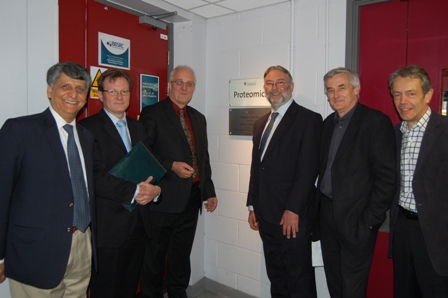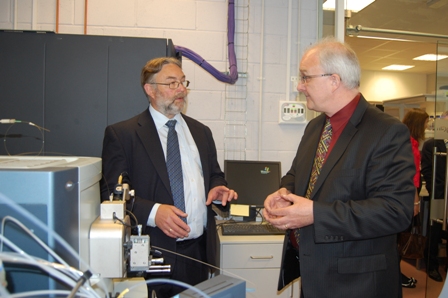Professor Douglas Kell, Chief Executive of the Biotechnology and Biological Sciences Research Council (BBSRC), has opened a new laboratory for the study of proteomics at the University of Liverpool.
The proteomics facility, which has been relocated from the School of Veterinary Science to refurbished laboratory space in the Biosciences building, is now home to 13 mass spectrometers and the Protein Function Group, a research team of 16 scientists.
The Protein Function Group has also hosted a day of events for scientists across the University to demonstrate how the facility can support research across health and life sciences. The group is interested in the roles that proteins play in a range of systems and aims to provide expertise in protein chemistry and enzymology to researchers and industry partners.
The team is currently working on a range of projects, including the development of new technology for quantifying every protein in a cell, in the role of proteins in chemical signalling and in the discovery of novel biomarkers of disease processes.
Professor Rob Beynon, Head of the Group, said: “This facility will allow us to engage with more and more of our colleagues across and beyond the University, offering advice and completing proteome analyses in a range of research programmes. We were pleased to welcome Professor Kell to the Proteomics Laboratory and look forward to working with scientists at Liverpool, as well as other partner industries and institutions on important biological and biomedical challenges.”
Professor Douglas Kell, Chief Executive of BBSRC, said: “Often it is technology development that drives innovation in bioscience and it is notable that many more Nobel Prizes in Biomedicine and Chemistry have been awarded for developing new techniques than for discovering new genes. Among those Nobel prize winners are Koichi Tanaka and John Fenn who developed the forms of soft-ionisation mass spectrometry that drove our ability to do proteomics – a technique that took off in the 1990s.
“Proteomics has in 15 years become a tool that touches almost every area of bioscience. This excellent facility at the University, supported by funding by BBSRC and the University, will offer bioscience researchers an unrivalled opportunity to work on a wide range of problems to tackle some of the most important challenges we face.
“By studying the range of proteins that exist in a cell – the proteome – we can understand everything from evolution to crop improvement and healthy ageing. This opens up the field for improvements in future food security, ensuring that long lives are also healthy lives, and the shift towards a sustainable, knowledge based, green economy.”
Professor Kell was also at the University to give a Science and Society Lecture.

Professor Samar Hasnain, Max Perutz Professor of Molecular BioPhysics, Professor Ian Greer, Executive Pro-Vice-Chancellor for the Faculty of Health and Life Sciences, Professor Rob Beynon, Professor Douglas Kell, Professor Jon Saunders and Professor Simon Gaskell, Principal of Queen Mary, University of London
